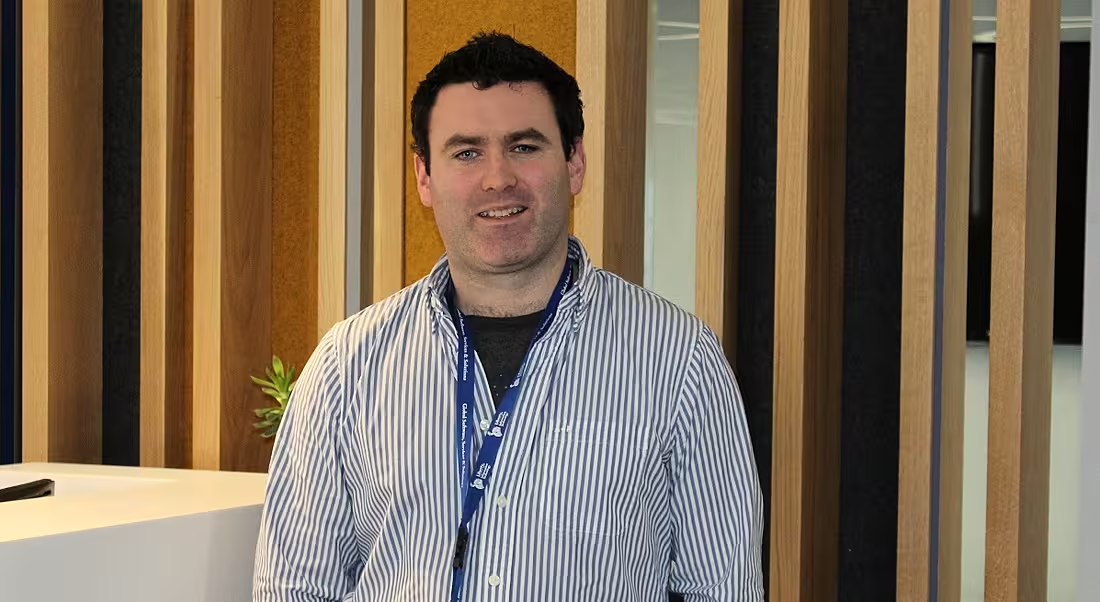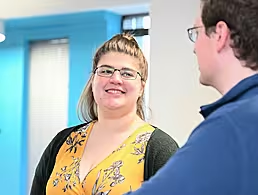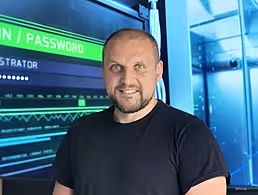The job of a software engineer is so much more than what you might think, and innovation is a major part of the role.
The role of a software engineer is one of the most in-demand jobs on the tech scene right now. However, there’s a lot more to the job than you might expect.
The role differs even more if you’re working as part of an innovative team tasked with prototyping new technologies.
Andy O’Sullivan is a principal software engineer at Liberty IT. Here, he tells us about what his job entails, and the work carried out by his innovation team.
What is your role within Liberty IT?
I’m a principal software engineer in our ‘Incubator’ – an innovation team whose role is to research and prototype new technologies and concepts for the benefit of our customers and the company.
If there is such a thing, can you describe a typical day in the job?
Each morning, I have a stand-up meeting with my Incubator colleagues, who are based in our Belfast office, while I’m based in Dublin. We discuss what we did yesterday and our plans for the day.
My work itself is varied; I work on different projects and initiatives concurrently, so my days are rarely the same.
If my main tasks for the day are coding-related, I’ll probably take my MacBook to one of the armchairs in a corner of the office to work in peace, while listening to some music – most likely movie soundtracks, as I find instrumental music best for coding. Tron: Legacy is currently on deck.
If I’m working with hardware such as augmented (AR) or virtual reality devices, I’ll find somewhere with space to try it out, so I don’t accidentally walk into any walls. If I’m working on some artificial intelligence (AI)/cognitive tech, I’ll find somewhere where I won’t disturb everyone else around me with a whole lot of repeated questions to a machine.
I could also have some in-person and online meetings with colleagues or with our business customers, who are mainly US-based.
I also give talks about innovation and future technology, to both internal colleagues and externally, which is a great part of the job. We just hosted Pobalscoil Iosolde from Palmerstown, Dublin, in the office; I gave a talk about emerging technology and what the future may hold in store.
What types of project do you work on?
My role is to explore new technologies, and we do this through pure research and through engagements with our business customers.
For our research, we work with technologies that we think will have an impact. They could be anything from a new piece of hardware or using a new software SDK, to building a new type of product.
Just as important are our projects with our business customers, where we learn more about their problems/opportunities and then build prototypes using emerging tech to see where we can add value.
These engagements can last anywhere between four and 12 weeks, at the end of which we’d expect to have some working prototypes built, along with possible architectures for production implementations, iterative customer feedback, and insights into the technologies and concepts involved.
What skills do you use on a daily basis?
Time management is one. We have numerous projects on the go at any one time, at various stages, along with multiple technologies that we want to research. So, I need to manage my time to make sure I’m being as efficient as possible.
Apart from that, a major skill needed in my role is being able to learn quickly about new technologies. By the nature of what I work on, there’s probably not going to be the same amount of information, reference material or examples of previous work in those areas online. Being comfortable with the unknown is essential.
What is the hardest part of your working day?
That’s a tough question! Probably leaving my kids in the morning to go to work. Work-wise, I like to set my (and my team’s) expectations high, putting ourselves under pressure to excel and deliver real value. I love dreaming and aiming big, then figuring out how we get there.
Do you have any productivity tips that help you through the working day?
Keep track of all your tasks, even minor ones. We use various tools to track and measure our work – not as a stick over our heads, but rather to help us focus and prioritise.
I recently created what we’ve called ‘The Wall of Insight’ where we, as a team, have up on a wall everything we do and plan to do, big or small. Projects, blogposts, demos, meet-ups, conference talks – everything. It’s a great visual aid that can show at a glance how the team is performing; it’s completely transparent and encourages us to do the things we said we would.
When you first started this job, what were you most surprised to learn was important in the role?
My previous role with my last employer was also in a pure innovation team so, for working in Liberty IT, I had experience in what was expected and what is important.
Looking back, however, to when I started working mainly with emerging tech, I learned over time that it is incredibly important to bring people along with you on the journey – customers, other IT teams, business stakeholders etc.
An innovation team can never work in isolation; it’s always one part of a bigger picture, and augments and collaborates with the rest of the great work going on in an organisation.
You won’t succeed by suddenly revealing an amazing new solution and expecting everyone to row in behind you. Instead, you need to involve relevant parties at each stage of development, to get their input and their support organically.
How has this role changed as this sector has grown and evolved?
Innovation as an area is constantly changing through emergence of new technologies and methods, along with the business expectations that come with them. It could be blockchain one quarter, then it’s chatbots that everyone is talking about, then it’s all about AI.
The important thing is to always focus on what customers and users actually care about and how to add real value – either in terms of reducing cost, generating revenue or improving customer satisfaction.
It can be easy to get distracted by the latest buzzwords, but remaining true to your core principles and mission will help.
What do you enjoy most about the job?
I basically have a dream job so that’s another tough question!
I really enjoy thinking about the future and how technology will change and impact our lives. When I talked to the recent school group, I told them about how growing up in the ’80s and ’90s, the world was so different to the way it is now, and that, in another 20 years or less, it will be dramatically different as well.
Driverless cars, AR glasses, AI – all these will have significant impacts on our lives, and I love that my job allows me to research these fields and also be part of that change by working and building with new technologies.
I also love sharing my knowledge, both with my colleagues and externally, along with using the skills I learn in work for good purposes outside of work. On 18 January, I presented at the Tech for Good Dublin meet-up about app development, mainly aimed at charities that may want to build their own app.




